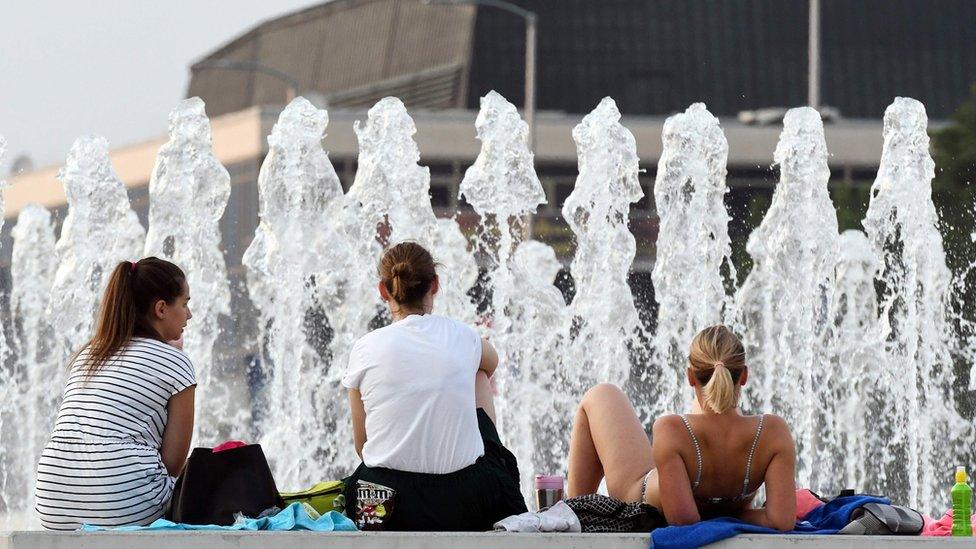Canada weather: Dozens dead as heatwave shatters records
- Published
Watch: Canadians say the conditions are "unbearable"
Dozens of people have died in Canada amid an unprecedented heatwave that has smashed temperature records.
Police in the Vancouver area have responded to more than 130 sudden deaths since Friday. Most were elderly or had underlying health conditions, with heat often a contributing factor.
Canada broke its temperature record for a third straight day on Tuesday - 49.6C (121.3F) in Lytton, British Columbia.
The US north-west has also seen record highs - and a number of fatalities.
Experts say climate change is expected to increase the frequency of extreme weather events, such as heatwaves. However, linking any single event to global warming is complicated.
US President Joe Biden said the heatwave was tied to climate change in a speech on Tuesday as he pitched a plan to update the country's infrastructure network.
On Wednesday he is meeting with governors of western US states and fire officials, as the annual North American wildfire season begins.
The heat over western parts of Canada and the US has been caused by a dome of static high-pressure hot air stretching from California to the Arctic territories. Temperatures have been easing in coastal areas but there is not much respite for inland regions.
Before Sunday, temperatures in Canada had never passed 45C.
British Columbia Premier John Horgan said the hottest week the province had ever experienced had led to "disastrous consequences for families and for communities".
The number of heat-related fatalities is likely to rise as some areas say they have responded to sudden death incidents but have yet to collate the numbers.
In Vancouver alone, heat is believed to have been a contributing factor in the unexpected deaths of 65 people since Friday.


"I've been a police officer for 15 years and I've never experienced the volume of sudden deaths that have come in in such a short period of time," police sergeant Steve Addison said. Three or four a day is the normal number.
He said people were arriving at relatives' homes and "finding them deceased".
Dozens of officers have been redeployed in the city, while the increased volume of emergency calls has created a backlog and depleted police resources.
British Columbia Chief Coroner Lisa Lapointe said 100 more deaths than normal had been reported in the period from Friday to Monday.
Allow X content?
This article contains content provided by X. We ask for your permission before anything is loaded, as they may be using cookies and other technologies. You may want to read X’s cookie policy, external and privacy policy, external before accepting. To view this content choose ‘accept and continue’.

The tiny village of Lytton, about 155 miles (250 km) east of Vancouver - and not much further south than London - has recorded all of Canada's recent record highs.
Resident Meghan Fandrich said it had been "almost impossible" to go outside.
"It's been intolerable," she told the Globe & Mail newspaper., external "We're trying to stay indoors as much as possible. We're used to the heat, and it's a dry heat, but 30 [degrees] is a lot different from 47."
Canada temperature reaches record 49.6C
Many homes in British Columbia do not have air conditioning as temperatures are usually far milder during the summer months.
One Vancouver resident told AFP news agency that hotels seemed to be sold out, as people flocked there for air-conditioning, adding: "I've never seen anything like this. I hope it never becomes like this ever again."
The country's weather service, Environment Canada, has issued heat warnings for the provinces of British Columbia and Alberta, along with areas of Saskatchewan, the Northwest Territories and Manitoba.
Jodi Hughes, weather anchor at Global News Calgary, told the BBC that firefighters were extremely concerned at the possibility of wild fires, possibly sparked by thunderstorms that could occur as the weather pattern changes.

How to ward off the heat
Stay cool. It may sound obvious, but if your body hits 40C (104F) heat-stroke can set in, which requires urgent medical help, as it could lead to loss of consciousness, organ failure, even death. Danger signs include sweat stopping - feeling hot, but dry - and breathing difficulties
Food and water. Again obviously, drink water (and avoid diuretics like caffeine) - and don't take your thirst as a guide, as you could still be dehydrating. Food with high water content is good; having to digest heavy meals isn't
Stay in the shade. Indoors if you can. Limit travel to cooler parts of the day if possible. Be careful with exercise
Clothing. Try to keep covered, but with fabrics like linen and cotton that are more breathable. Wear a hat, preferably with ventilation
Cooling methods. If you find air-conditioning eco-unfriendly or don't have it, try fans (maybe with ice cubes in front), gels, face sprays, a cold water bottle, a cool shower. Draw the curtains to cool the room temperature

Records fall in western US
In the US Pacific Northwest on Monday, temperatures hit 46.1C in Portland, Oregon, and 42.2C in Seattle, Washington, the highest levels since record-keeping began in the 1940s, the National Weather Service said.
At least a dozen deaths in Washington and Oregon are believed to be linked to the heatwave.
A doctor in a Seattle hospital told the Seattle Times, external the number of patients streaming in with heat stroke was comparable to the beginning of the Covid-19 pandemic.
Dr Jeremy Hess said some had kidney or heart problems, and one man had third-degree burns from walking on asphalt.
Seattle resident Mark Aldham set up a cooling system in his front yard with free snacks and drinks. "It is super hot here. So my partner and I, we set up some shade that we have from [Nevada festival] Burning Man to help cool off our neighbourhood and keep everyone safe," he told Reuters.
The heat has been intense enough to melt cables, shutting down the Portland Streetcar Service on Sunday.
Allow X content?
This article contains content provided by X. We ask for your permission before anything is loaded, as they may be using cookies and other technologies. You may want to read X’s cookie policy, external and privacy policy, external before accepting. To view this content choose ‘accept and continue’.

An electrical utility in Spokane, Washington, has also introduced rolling blackouts to cope with huge power demand as residents run air conditioners.
Agricultural workers are often now being given the option to start at dawn and finish at noon. But labour contractors say that some stay on to work regardless of the heat.
One worker was found dead in a field at the end of his shift at a farm in Oregon.
One Seattle resident told AFP that the city felt like a desert: "Normally... 60, 70 degrees [Farenheit] is a great day - everybody is outside in shorts and T-shirts - but this is... ridiculous."
Amazon allowed members of the public into areas of its Seattle headquarters as a cooling-off location on Monday, while people in Portland also flocked to cooling centres.
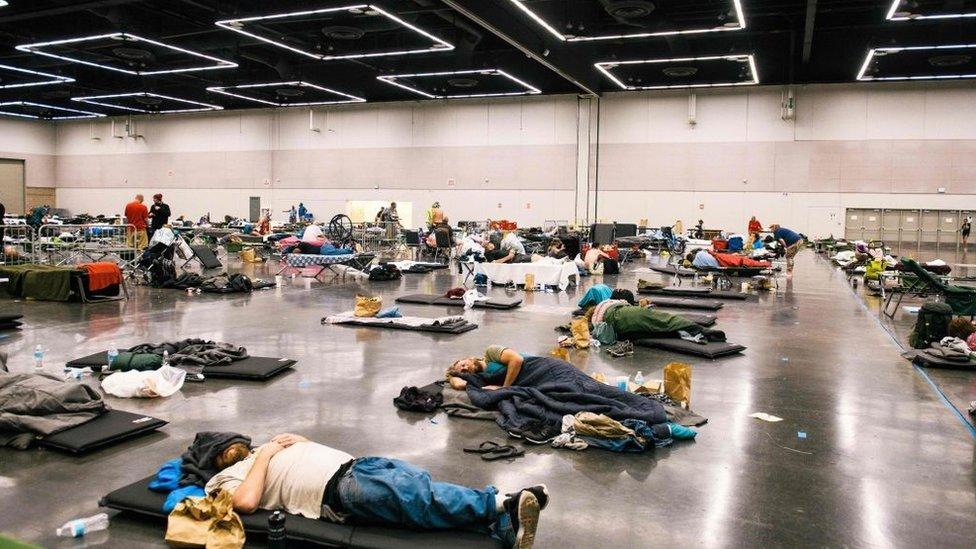
Portland residents have flocked to cooling centres


Have you been affected by the high temperatures? Share your experiences by emailing haveyoursay@bbc.co.uk, external.
Please include a contact number if you are willing to speak to a BBC journalist. You can also get in touch in the following ways:
WhatsApp: +44 7756 165803
Tweet: @BBC_HaveYourSay, external
Please read our terms & conditions and privacy policy
If you are reading this page and can't see the form you will need to visit the mobile version of the BBC website to submit your question or comment or you can email us at HaveYourSay@bbc.co.uk, external. Please include your name, age and location with any submission.
- Published28 June 2021
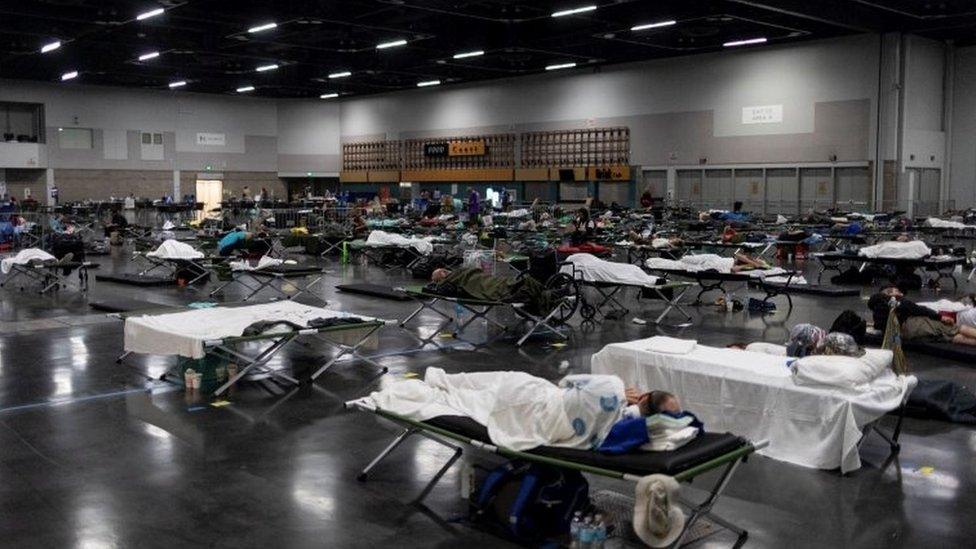
- Published18 June 2021
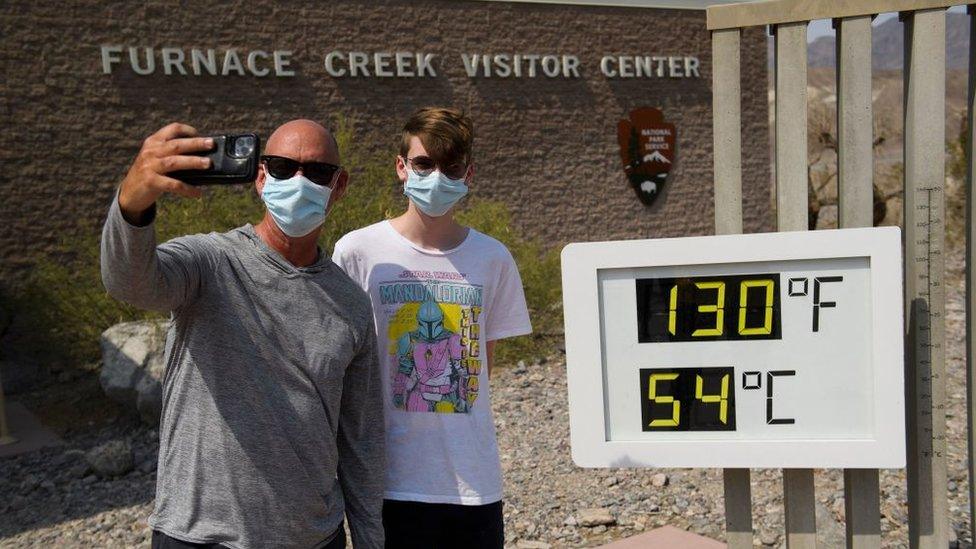
- Published19 August 2020
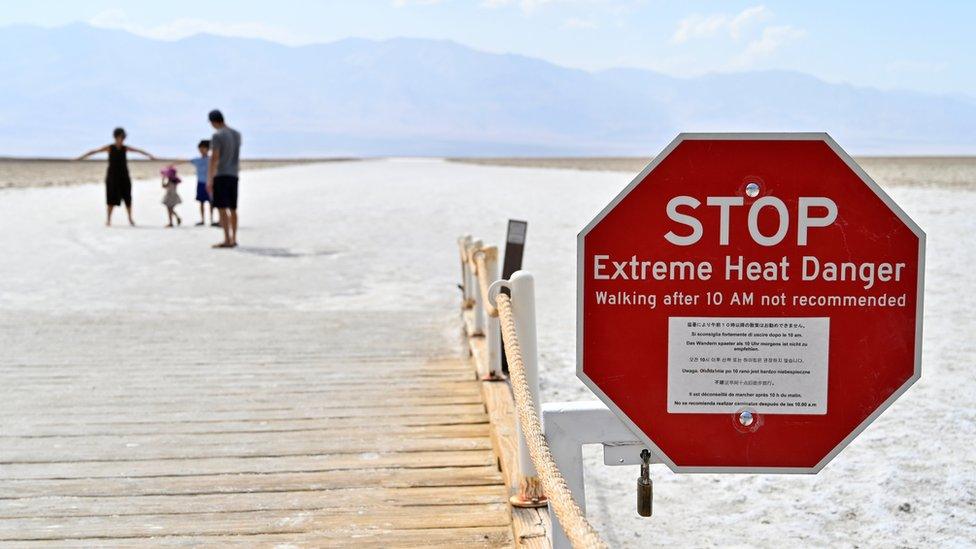
- Published25 June 2020
